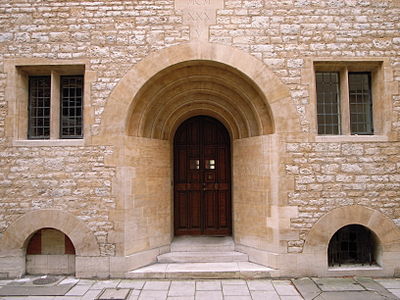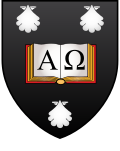| Main page | Indices | Projects |
The University of Oxford portal
The University of Oxford is a collegiate research university in Oxford, England. There is evidence of teaching as early as 1096, making it the oldest university in the English-speaking world and the world's second-oldest university in continuous operation. It grew rapidly from 1167, when Henry II banned English students from attending the University of Paris. After disputes between students and Oxford townsfolk in 1209, some academics fled north-east to Cambridge where they established what became the University of Cambridge. The two English ancient universities share many common features and are jointly referred to as Oxbridge.
The University of Oxford is made up of thirty-nine semi-autonomous constituent colleges, four permanent private halls, and a range of academic departments which are organised into four divisions. Each college is a self-governing institution within the university, controlling its own membership and having its own internal structure and activities. All students are members of a college. Traditionally, each of Oxford's constituent colleges is associated with another of the colleges in the University of Cambridge, with the only exceptional addition of Trinity College, Dublin. It does not have a main campus, and its buildings and facilities are scattered throughout the city centre. Undergraduate teaching at Oxford consists of lectures, small-group tutorials at the colleges and halls, seminars, laboratory work and occasionally further tutorials provided by the central university faculties and departments. Postgraduate teaching is provided in a predominantly centralised fashion.
Oxford operates the Ashmolean Museum, the world's oldest university museum; Oxford University Press, the largest university press in the world; and the largest academic library system nationwide. In the fiscal year ending 31 July 2023, the university had a total consolidated income of £2.92 billion, of which £789 million was from research grants and contracts.
Oxford has educated a wide range of notable alumni, including 30 prime ministers of the United Kingdom and many heads of state and government around the world. 73 Nobel Prize laureates, 4 Fields Medalists, and 6 Turing Award winners have matriculated, worked, or held visiting fellowships at the University of Oxford, while its alumni have won 160 Olympic medals. Oxford is the home of numerous scholarships, including the Rhodes Scholarship, one of the oldest international graduate scholarship programmes. (Full article...)
Selected article
The Council of Keble College, Oxford ran the college (in conjunction with the Warden) from its foundation in 1868 until 1952. The council – a group of between nine and twelve men – has been described as "an external Council of ecclesiastical worthies", as most of the members came from outside the college, and many were not otherwise linked to the university. Keble was established by public subscription as a memorial to the clergyman John Keble. The first council members were drawn from the committee whose work had raised the money to build the college. By keeping matters relating to religion and the college's internal affairs in the hands of the council, the founders hoped to maintain Keble's religious position as "a bastion of 'orthodox' Anglican teaching" against the opponents of Tractarianism. In total, 54 men served on the Council, 11 of whom were college alumni; in 1903, Arthur Winnington-Ingram (Bishop of London) became the first former Keble student to join the council. It ceased to exist after 9 April 1952, when new statutes of the college placed full management in the hands of the Warden and Fellows. (Full article...)
Selected biography
Selected college or hall
Linacre College is a college for graduate students on St Cross Road, near the University Parks to the north-east of the city centre, and close to the university's science area. It was founded in 1962, originally as a non-residential and non-collegiate body called "Linacre House" to provide a base for graduates in Oxford. It moved to its present site in 1977, became financially independent of the university in 1980 and acquired full college status in 1986. The college is named after Thomas Linacre (1460–1524), a distinguished humanist, medical scientist and classicist. There are about 300 students in a range of subjects; many are from overseas, with over fifty different countries represented. Linacre was the first Oxford college to admit men and women on an equal basis. The principal is the botanist Nick Brown, appointed in 2009. There are about 50 Fellows, with former Fellows including the Nobel Prize winner Paul Nurse and the biologist Chris Dobson. Former students include the journalist Yasmin Alibhai-Brown, the literary critic Terry Eagleton and the Christian writer and academic Alister McGrath. (Full article...)
Selected image

Did you know
Articles from Wikipedia's "Did You Know" archives about the university and people associated with it:
- ... that Seymour King, Member of Parliament for Kingston upon Hull Central for 25 years, was the first climber to reach the summits of Mont Maudit and Aiguille Blanche de Peuterey (pictured)?
- ... that Andrew N. Meltzoff's research revealed that infants of only a few weeks of age can imitate facial expressions and hand gestures?
- ... that civil engineer Robert Wynne-Edwards was the first President of the Institution of Civil Engineers to be elected while still working as a contractor?
- ... that Irish cricketer and artist Robert Gregory was the subject of four poems by W. B. Yeats?
- ... that when a rival took over an estate belonging to Sir Walter Clarges, Clarges used his position as a Member of Parliament to send the interloper to jail?
Selected quotation
Selected panorama
On this day
Events for 5 May relating to the university, its colleges, academics and alumni. College affiliations are marked in brackets.
|
Births
|
Deaths
|
Wikimedia
The following Wikimedia Foundation sister projects provide more on this subject:
-
Commons
Free media repository -
Wikibooks
Free textbooks and manuals -
Wikidata
Free knowledge base -
Wikinews
Free-content news -
Wikiquote
Collection of quotations -
Wikisource
Free-content library -
Wikiversity
Free learning tools -
Wikivoyage
Free travel guide -
Wiktionary
Dictionary and thesaurus














